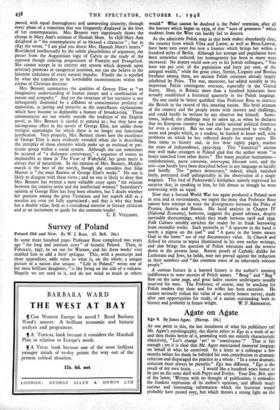Survey of Poland
Poland Old and New. By W. J. Rose. (G. Bell. 26s.) IN some three hundred pages Professor Rose completed two years ago " the long and intricate story " of historic Poland. Then, in February, 1947, he set out for Warsaw, and his three weeks' visit enabled him to add a brief epilogue. This, with a postscript and three appendices, adds value to what is, on the whole, a unique picture of a nation also unique. " Life in Poland," wrote one of her most brilliant daughters, "is like living on the side of a volcano. Happily we are used to it, and do not mind so much as others
would." What cannot be doubted is the Poles' retention, after all the horrors which began in 1939, of that " aura of greatness" which students from the West can hardly fail to discern.
As the admirable Polish map in this book makes abundantly clear, the country from which Vilna and Lwow, as well as Brest-Litovsk, have been torn away has now a frontier which brings her within a hundred miles of Berlin. Although her acreage and population have been somewhat reduced, her homogeneity has been in many ways increased. No deputy could now cry to his Jewish colleagues, " You have ten per cent. of the population and forty per cent. of the national wealth," while the great cities, Stettin, Liegnitz and Breslau foremost among them, are ancient Polish creations already largely inhabited by Poles. The war, moreover, has added notably to the important Polish contingents overseas, especially in the United States. Here, in Britain, more than a hundred historians have actually established a historical quarterly in the Polish language.
No one could be better qualified than Professor Rose to instruct the British in the record of this amazing nation. His brief account of the country and the people teems with interest and challenge, and could hardly be written by any observer but himself. Some- times, indeed, the challenge may be taken up, as when he declares that no European country has had stable national political frontiers for even a century. But no one else has portrayed so vividly a scene and people which, as a student, he learned to know well, with problems on which he has reflected deeply for many years. He then turns to history and, in less than eighty pages, reaches the years of independence, 1919-1939. This " historical " section may well make strangers to Poland glad that the author wrote " in hours snatched from other duties." Her many peculiar institutions— confederations, pacta conventa, interregna, liberum veto, and the rest—can hardly have been described before in any language so lucidly and briefly. The " gentry democracy," indeed, which vanished lately, portrayed itself unforgettably in the observation of a single magnate. This lord of Paderewski's birthplace naïvely expressed his surprise that, in speaking to him, he felt almost as though he were conversing with an equal.
Now that a Second World War has again produced a Poland new in area and in environment, we regret the more that Professor Rose cannot here attempt to trace the divergencies between the Poles of Prussia, Austria and Russia. His lucid analysis in Chapter IV (National Economy), however, suggests the grand advance, despite inevitable shortcomings, which they made between 1918 and 1939. Folk Culture notably enriches the reader by its frank borrowing from recondite works. Such proverbs as " A sparrow in the hand is worth a pigeon on the roof " and " A guest in the home means God in the home" are of real documentary value. In Church and School he returns to topics illuminated in his own earlier writings, and also brings the question of Polish toleration and the reverse down to the present hour. Recent proofs of Catholic dislike for Lutherans and Jews, he holds, may not prevail against the reduction in their numbers and "the common sense of an inherently tolerant people."
A curious feature in a learned history is the author's seeming indifference to some niceties of Polish names. " Boug " and " Bug " flow on the same page, and great ladies receive soubriquets usually reserved for men. The Professor, of course, may be teaching his Polish readers that their zeal for trifles has been excessive. He cannot seriously reduce the value of an utterly honest survey, made after rare opportunities for study, of a nation outstanding both in
history and probably in future weight. W. F. REDDAWAY.


































 Previous page
Previous page